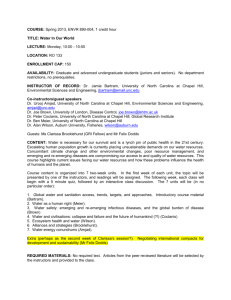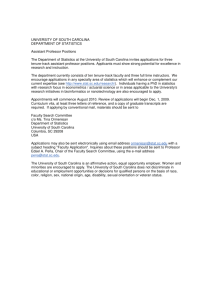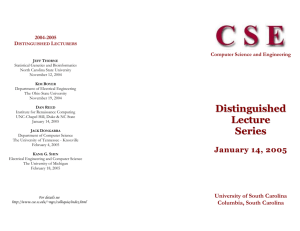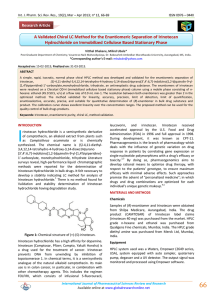Media Release
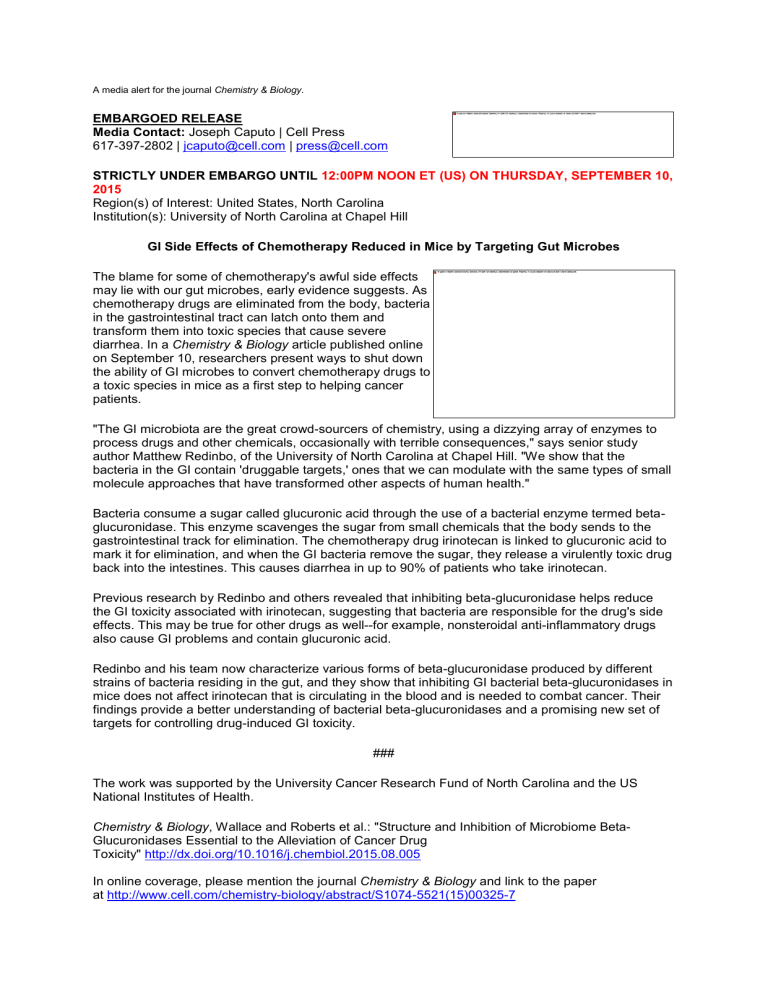
A media alert for the journal Chemistry & Biology.
EMBARGOED RELEASE
Media Contact: Joseph Caputo | Cell Press
617-397-2802 | jcaputo@cell.com
| press@cell.com
STRICTLY UNDER EMBARGO UNTIL 12:00PM NOON ET (US) ON THURSDAY, SEPTEMBER 10,
2015
Region(s) of Interest: United States, North Carolina
Institution(s): University of North Carolina at Chapel Hill
GI Side Effects of Chemotherapy Reduced in Mice by Targeting Gut Microbes
The blame for some of chemotherapy's awful side effects may lie with our gut microbes, early evidence suggests. As chemotherapy drugs are eliminated from the body, bacteria in the gastrointestinal tract can latch onto them and transform them into toxic species that cause severe diarrhea. In a Chemistry & Biology article published online on September 10, researchers present ways to shut down the ability of GI microbes to convert chemotherapy drugs to a toxic species in mice as a first step to helping cancer patients.
"The GI microbiota are the great crowd-sourcers of chemistry, using a dizzying array of enzymes to process drugs and other chemicals, occasionally with terrible consequences," says senior study author Matthew Redinbo, of the University of North Carolina at Chapel Hill. "We show that the bacteria in the GI contain 'druggable targets,' ones that we can modulate with the same types of small molecule approaches that have transformed other aspects of human health."
Bacteria consume a sugar called glucuronic acid through the use of a bacterial enzyme termed betaglucuronidase. This enzyme scavenges the sugar from small chemicals that the body sends to the gastrointestinal track for elimination. The chemotherapy drug irinotecan is linked to glucuronic acid to mark it for elimination, and when the GI bacteria remove the sugar, they release a virulently toxic drug back into the intestines. This causes diarrhea in up to 90% of patients who take irinotecan.
Previous research by Redinbo and others revealed that inhibiting beta-glucuronidase helps reduce the GI toxicity associated with irinotecan, suggesting that bacteria are responsible for the drug's side effects. This may be true for other drugs as well--for example, nonsteroidal anti-inflammatory drugs also cause GI problems and contain glucuronic acid.
Redinbo and his team now characterize various forms of beta-glucuronidase produced by different strains of bacteria residing in the gut, and they show that inhibiting GI bacterial beta-glucuronidases in mice does not affect irinotecan that is circulating in the blood and is needed to combat cancer. Their findings provide a better understanding of bacterial beta-glucuronidases and a promising new set of targets for controlling drug-induced GI toxicity.
###
The work was supported by the University Cancer Research Fund of North Carolina and the US
National Institutes of Health.
Chemistry & Biology , Wallace and Roberts et al.: "Structure and Inhibition of Microbiome Beta-
Glucuronidases Essential to the Alleviation of Cancer Drug
Toxicity" http://dx.doi.org/10.1016/j.chembiol.2015.08.005
In online coverage, please mention the journal Chemistry & Biology and link to the paper at http://www.cell.com/chemistry-biology/abstract/S1074-5521(15)00325-7
Related Files
This Dropbox contains: https://www.dropbox.com/sh/96qwsex98n37ijt/AAD9ZkAXASjuXIWGAiaIiYpIa?dl=0
A PDF of the paper proof
A high-resolution image of a microbiome drug target complexed with a selective chemical probe.(Credit: Samuel Pellock, University of North Carolina)
Author Contact:
Matthew Redinbo
University of North Carolina at Chapel Hill
+1 919-962-4581 redinbo@unc.edu
Media Contact:
Media Relations
University of North Carolina at Chapel Hill
+1 919-445-8555 mediarelations@unc.edu



